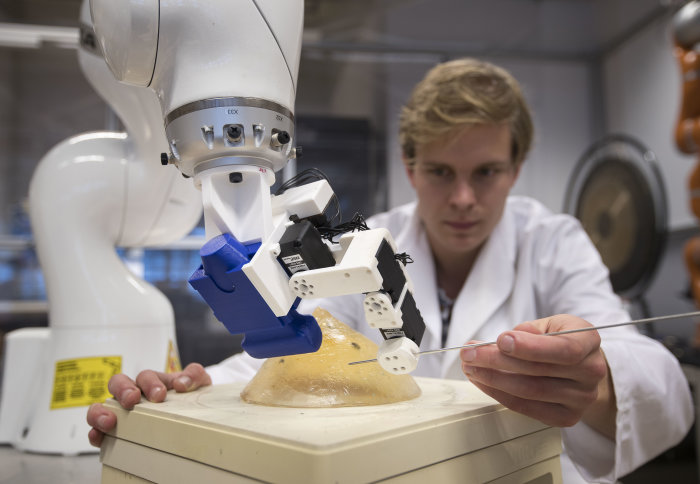EU Commission invests €16m to accelerate innovation in robotics for healthcare

The European Commission invests €16 million in DIH-HERO (Digital Innovation Hubs in Healthcare Robotics).
This European project aims to boost innovation and implementation of robotics in healthcare. The project consortium, which is led by the University of Twente (as coordinator), consists of 17 partners spread across 10 European countries. The consortium is aimed to establish an independent platform meant to connect businesses, knowledge institutes, investors and other stakeholders, facilitate collaboration and support them to make their products and services in the field of robotics available to healthcare providers.
Imperial College, represented by the Robotics Forum, will lead the UK-Hub for DIH-HERO, which encompasses all major players in healthcare robotics nationwide: the University of Bristol and the University of the West of England, King’s College London, Queen Mary University, Sheffield Hallam University, the University of Cambridge, the University of Leeds, the University of Oxford, the University of Reading, University College London, the University of Dundee, the University of Edinburgh, the University of Liverpool, the University of Sheffield, and the University of Warwick.
Stefano Stramigioli, professor in robotics at the University of Twente and coordinator of the pan-European network, explains: “The route for embedding medical innovations in clinical practice is tough, time-consuming and requires substantial investments. It involves clinical testing, developing efficient production methods, reaching investors, establishing a company and handling distribution, just to mention a few steps. Furthermore, multiple actors are working on various innovations in robotics.”
The European Commission aims to accelerate this ‘innovation cycle’ throughout the entire value chain, making sure that the products and services are developed efficiently by connecting the relevant stakeholders. Each of the 17 partners within the consortium represents a network of healthcare- and knowledge institutes, investors and commercial businesses active in robotics for healthcare.
Through joining forces, it is planned to build up a DIH-HERO platform during the next four years. This platform will significantly leverage added value throughout the entire value chain in the healthcare ecosystem, by sharing knowledge, connecting the right stakeholders and stimulating tailored investments.
“We are delighted with this grant of €16 million, of which more than €8 million will be distributed to commercial companies in order to support their efforts in development and implementation of digital technologies”, Stefano Stramigioli states.
“We are convinced that DIH-HERO can make a real difference concerning innovation in healthcare and will add significant value throughout the value chain, striving to bring excellent products and services to the market, to the best benefit of the end-consumer - the patient”, Stramigioli concludes.
SMEs and midcaps located in Europe can apply for funding in open calls from summer 2019 until spring 2021. Funding will be available for travelling, demonstrators and technology transfer.
Imperial College’s role will be to capture knowledge about associated partners, and the organisations within the wider DIH-HERO network with respect to robotics innovation, research and healthcare innovation resources. This knowledge will be accessible via an online portal that will connect our regional ecosystem to partners, needs and markets, helping to foster connections and develop new business models.
As a core partner, Imperial College will also seek to grow and improve the network within our region and across Europe, by monitoring our activities, assessing the impact and success in cross-fertilisation and disseminate training for hubs in the network.
For more information and details on upcoming calls, please go to: www.dih-hero.eu. This project has received funding from the European Union’s Horizon 2020 research and innovation programme under grant agreement No 825003.
Article text (excluding photos or graphics) © Imperial College London.
Photos and graphics subject to third party copyright used with permission or © Imperial College London.
Reporter
Press Office
Communications and Public Affairs
- Email: press.office@imperial.ac.uk
